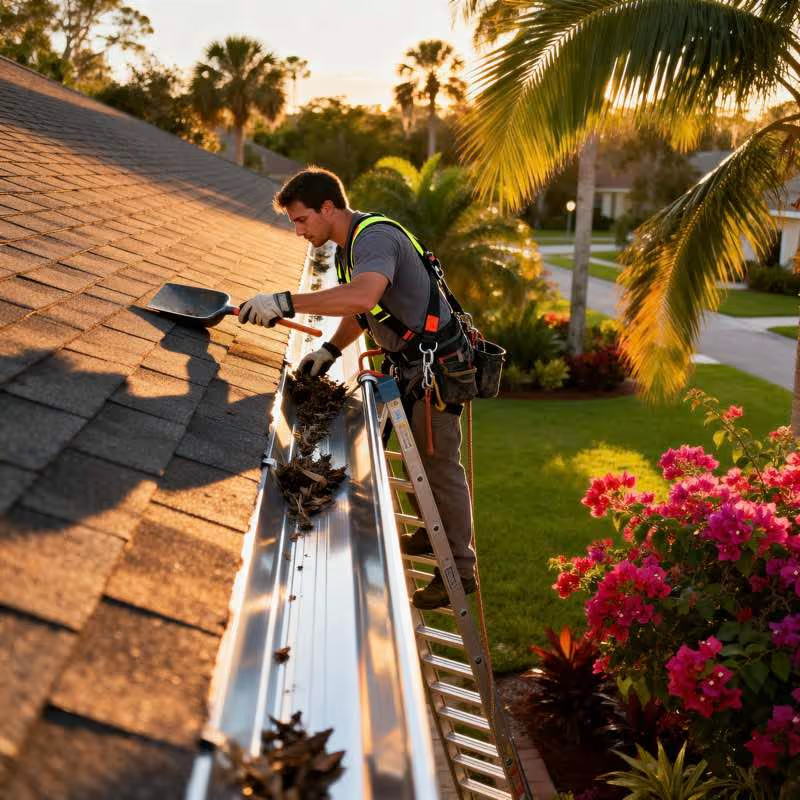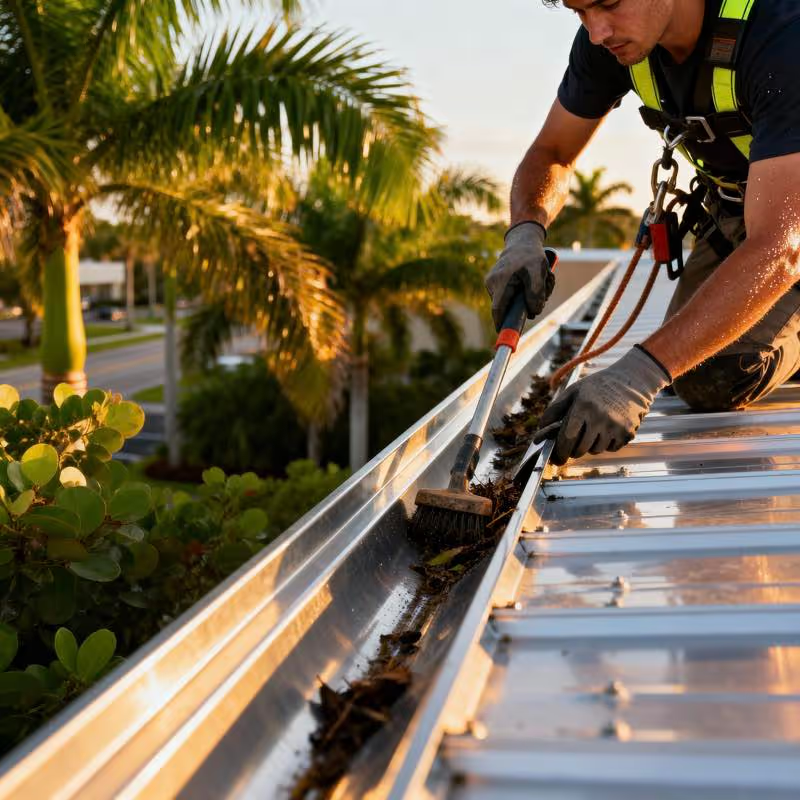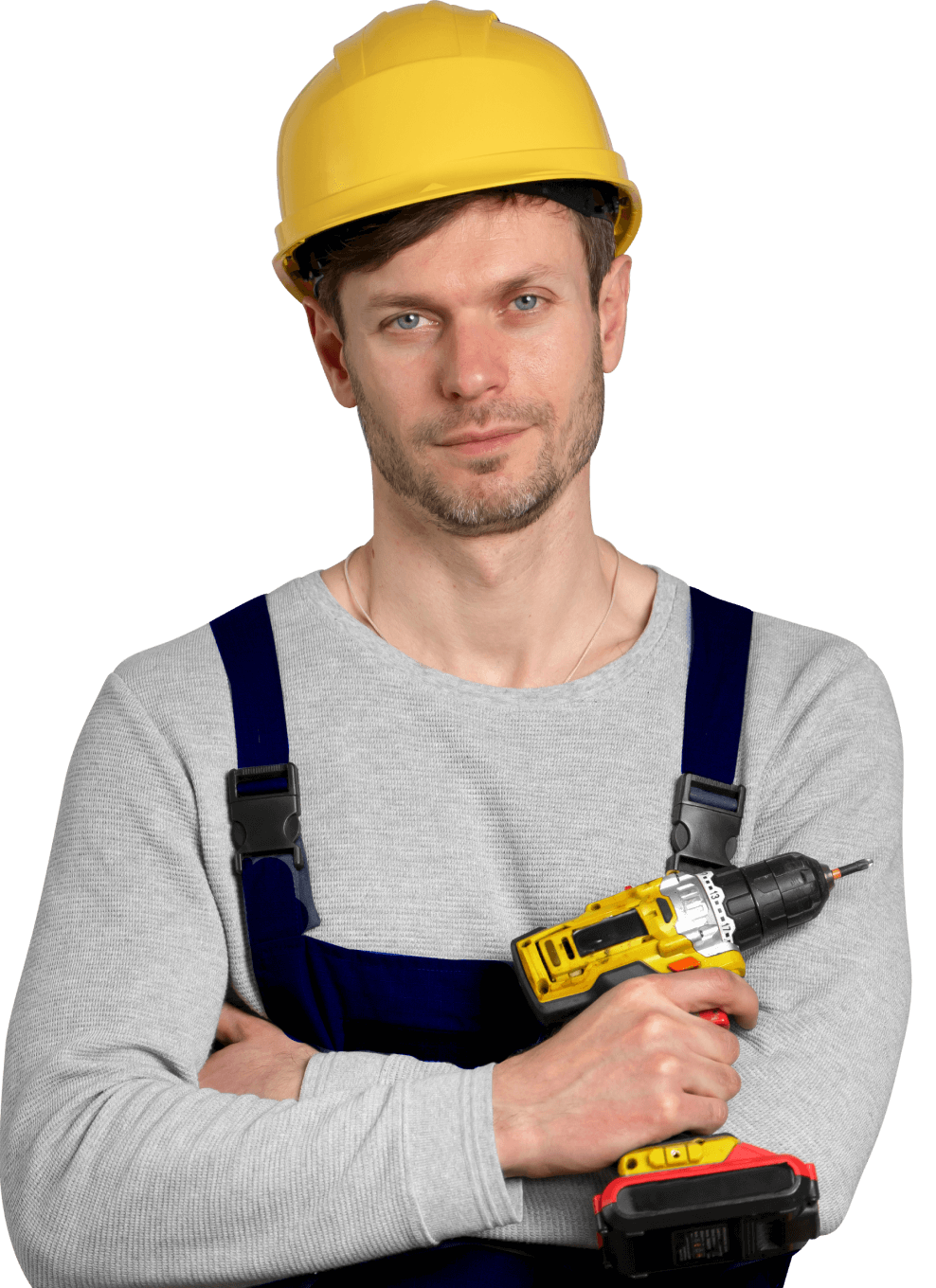
Professional Pressure Washing in Orlando: Remove Mold, Algae & Storm Debris Fast
Professional pressure washing in Orlando removes the mold, algae, and storm debris that accumulate fast in Florida's humidity, restoring your property's appearance and protecting surfaces from permanent damage.
Pressure Washing Removes Algae, Mold, and Mildew That Damage Orlando Surfaces
Those black streaks on your roof and green slime on your driveway aren't just ugly. They're actually eating away at your property. Orlando's humid weather creates the perfect environment for algae, mold, and mildew to grow fast and spread quickly.
These organisms produce acids that break down concrete and stucco. The algae on your roof holds moisture against your shingles, making them wear out years earlier than they should. On concrete driveways, the acids create tiny holes and rough patches that get worse over time.
I've cleaned hundreds of Orlando homes where owners thought their surfaces were permanently stained. One College Park homeowner was shocked when pressure washing revealed her driveway's original cream color—she hadn't seen it in five years because of algae buildup.
The worst part? Once this growth starts, it spreads fast. Those black roof streaks are living bacteria colonies that keep growing across your entire roof. The green patches on your driveway release spores that spread to your sidewalk, pool deck, and even your neighbor's property. The same organic growth affects windows and glass surfaces, requiring educational facility glass cleaning to maintain visibility and safety standards in Orlando schools.
Professional pressure washing removes these organisms at the root level. We adjust water pressure for each surface type—strong enough to eliminate deep growth without damaging your property. For stubborn algae, we use eco-friendly treatments that kill the organisms and slow regrowth, giving you months of protection even during Orlando's humid summer.
In neighborhoods like Winter Park and Baldwin Park, north-facing walls and tree-shaded driveways show the most dramatic changes after cleaning. Orlando's 50+ inches of yearly rainfall and 75% humidity means these shaded surfaces stay wet constantly, making them perfect for mold and algae growth.


The Best Time to Pressure Wash in Orlando Is During the Dry Season
Timing matters when you pressure wash your Orlando property. The dry season from November through April gives you the best results that last longer.
Here's why: After pressure washing, surfaces need time to dry completely. During rainy season (June through November), daily afternoon storms rewet everything before it dries properly. Those storms also drop fresh pollen, algae spores, and debris onto your just-cleaned surfaces.
I remember cleaning a Dr. Phillips home in late August. Despite great work, afternoon storms that week kept his driveway damp for days. Within a month, algae started coming back. When we cleaned his property again in February, the results lasted all summer because the surfaces had 3-5 sunny days to dry completely.
Dry season has another advantage. With less moisture in the air, our cleaning solutions work better. They go deeper into concrete and stucco, killing more spores and preventing regrowth. When we pressure wash during rainy season, constant humidity reduces treatment effectiveness by up to 40%.
Commercial property managers in Lake Nona schedule their quarterly cleanings strategically. They book November and February services during peak dry season, then add a quick maintenance wash in May before summer rains arrive.
For homeowners planning to sell, February and March are perfect months for pressure washing. Your home looks its best during spring selling season, and the cleaning holds up through multiple showings without touch-ups.
Pro tip: Book your dry season pressure washing in October or early November. By December, demand from homeowners preparing for holiday guests fills our schedule fast.
Pressure Washing Protects Your Investment by Preventing Costly Repairs
Every Orlando homeowner worries about expensive repairs. What starts small becomes a major cost when ignored. Pressure washing is one of the most cost-effective ways to avoid those nightmare repair bills.
Think about what happens when you ignore driveway algae. That greenish-black growth isn't just sitting there—it's eating into the concrete. Algae and mold produce acids that dissolve the materials holding your concrete together. Florida's limestone-based concrete is especially vulnerable to this damage.
I've seen Windermere homeowners face $8,000-$12,000 driveway replacement costs because they let organic growth destroy their concrete. Those same driveways could have been saved with annual $200-$300 pressure washing. That's a 40-to-1 return on investment.
Stucco damage follows the same pattern. When mold gets into Orlando's common stucco siding, it holds moisture against the wall. That constant dampness makes the stucco crack and eventually fall off. Downtown Orlando building owners spend $15,000-$25,000 on stucco repairs that could have been prevented with quarterly pressure washing.
The timeline from "minor staining" to "major damage" is surprisingly short in Orlando's climate. What looks harmless this year becomes serious damage within 2-3 years.
Pool decks present another example. Mold and algae on pool decks make them dangerously slippery when wet. That organic growth also traps water against the concrete, causing the surface to crack and flake. Replacing a pool deck costs $4,000-$8,000. Regular pressure washing costs $150-$250.
The math is simple: A typical Orlando home needs $400-$600 in annual pressure washing. That same home faces potential repair costs of:
- Driveway replacement: $8,000-$12,000
- Stucco repair: $15,000-$25,000
- Deck replacement: $4,000-$8,000
One year of skipped maintenance can trigger repair costs 20-50 times higher than preventive cleaning.
Choosing Between Power Washing and Pressure Washing for Different Surfaces
People use "power washing" and "pressure washing" like they mean the same thing. They're actually different services that work for different needs.
Pressure washing uses cold water at high pressure (1,500-3,000 PSI) to clean surfaces. The water force removes dirt, algae, and mold without heat. This works perfectly for most Orlando homes—concrete driveways, stucco siding, tile roofs, pavers, and pool decks.
Power washing adds heat to the mix, using hot water (sometimes over 200 degrees) with high pressure. The heat helps remove stubborn things like oil, grease, and chewing gum. It's usually unnecessary for homes and can actually damage certain surfaces.
Here's the important part: Orlando homes have materials that don't handle heat well. Stucco siding covers about half the homes in Winter Park and Thornton Park. It can crack when hot water hits it and then cools quickly. The sudden temperature change makes the stucco expand and contract, creating cracks that let water in.
Barrel tile roofs face similar risks. The glue holding tiles to your roof softens under heat, potentially letting tiles shift or fall off. I've seen power washing mistakes cost homeowners $3,000-$5,000 in roof repairs.
For painted surfaces, heat makes paint blister, peel, or fade. If you're maintaining a historic College Park home or a freshly painted Baldwin Park property, pressure washing protects your paint while power washing can strip it away.
So when does power washing make sense? Commercial properties with heavy oil or grease benefit from the heat. Restaurant parking lots, gas stations, or industrial areas need the degreasing power that hot water provides.
Different Orlando surfaces need different pressure levels:
- Wood decks: 500-600 PSI
- Stucco: 1,500-2,000 PSI
- Concrete driveways: 2,500-3,000 PSI
- Tile roofs: 1,200-1,500 PSI
- Pavers: 2,000-2,500 PSI
For 95% of Orlando home pressure washing needs, cold water at the right pressure delivers better results without damage risks that come with heat.
How Often Orlando Homes Need Pressure Washing Depends on Climate Exposure
Walk down any Orlando street and you'll notice some homes look perfect while neighbors show heavy algae growth. The difference isn't neglect—it's environmental exposure.
Most Orlando homes benefit from annual pressure washing. This yearly service removes accumulated algae, mold, and mildew that build up in our humid climate. For properties with moderate sun and minimal trees, once a year keeps surfaces looking good.
But several factors speed up that timeline. If your property has multiple risk factors, you probably need twice-yearly service.
Tree coverage is the biggest factor. Properties under mature oak trees in Winter Park or Baldwin Park get 2-3 times faster organic growth than homes in open sun. Constant shade keeps surfaces damp. Those trees also drop pollen, sap, and leaves that feed organic growth.
Lakefront properties face similar challenges. If you live near Lake Eola, Lake Nona, or the Butler Chain of Lakes in Windermere, you're dealing with algae spores constantly blown from the water. Higher humidity near water also means surfaces stay damp longer after rain.
Direction matters too. North-facing walls and driveways get less direct sunlight, staying damp and cool all day. These surfaces show algae and mold much faster than south or west-facing areas that get intense afternoon sun.
New construction gets a grace period. During your first year or two in a new Orlando home, surfaces haven't been colonized yet. You might go 18-24 months before needing your first pressure washing. After that, the organisms establish themselves and annual maintenance becomes necessary.
For Orlando homeowners, I recommend:
- Standard exposure (moderate sun, minimal trees): Annual pressure washing
- Heavy tree coverage or lakefront: Spring and fall service (twice yearly)
- Commercial properties: Quarterly maintenance
- Before selling: Always pressure wash regardless of last service date
Professional Pressure Washing Saves Time and Avoids DIY Surface Damage
Every spring, Orlando home improvement stores rent out dozens of pressure washers to homeowners who think they'll save money. By summer, many call us to fix damage they caused.
The appeal makes sense. Rental equipment costs $50-$100 for the day, compared to $400-$600 for professional service. But that savings disappears when you factor in your time, the learning curve, injury risk, and potential surface damage.
That 3,000 PSI stream is powerful enough to strip paint, gouge wood, damage concrete, crack stucco, and break windows. Within the first hour, most people learn why pressure washing takes training.
I've seen the damage in College Park and downtown Orlando homes. One homeowner tried cleaning his stucco siding and created hundreds of small craters across his wall. The repair cost $4,000—ten times what professional pressure washing would have cost.
The damage isn't always obvious right away. Wrong pressure on roof tiles can loosen the glue, creating leaks that don't appear until the next heavy rain. Too much pressure on driveways makes the surface rougher and more likely to stain.
Beyond surface damage, there's the physical toll. Orlando's 95-degree summer heat combined with controlling a pressure washer for hours leads to heat exhaustion fast. The equipment is heavier than it looks, and the spray wand kicks back hard.
What takes a homeowner an entire weekend takes our crew 2-4 hours. We have commercial equipment, multiple wands for different surfaces, and experience to work efficiently.
Professional pressure washing includes knowledge that equipment alone can't provide. We know Orlando's stucco needs 1,500-2,000 PSI maximum. We know barrel tile roofs need gentler treatment. We know which treatments work on algae without harming your plants. For surfaces with stubborn algae or mold, we pre-treat with professional-grade solutions that break down organic growth before pressure washing. These commercial products aren't available at consumer stores, and they make the actual washing process faster and more effective. Without pre-treatment, you're fighting against embedded growth that's been developing for months or years. According to the Power Washers of North America, professional training and certification in proper pressure washing techniques are essential for preventing surface damage and ensuring effective cleaning results.
The value is clear: You can spend an entire weekend, risk injury, potentially damage your property, and get poor results. Or you can hire professionals who finish in a few hours, guarantee results, carry insurance, and free up your weekend.
Frequently Asked Questions
How often should I pressure wash my Orlando home?
Most Orlando homes need annual pressure washing to remove algae, mold, and mildew. Homes with heavy tree cover or north-facing surfaces may need service twice per year. Lakefront properties also typically need spring and fall cleaning due to higher algae exposure.
Can pressure washing damage my stucco or tile roof?
Professional pressure washing uses correct pressure settings for Orlando's common materials and won't damage stucco or tile roofs. Stucco needs 1,500-2,000 PSI, while tile roofs need 1,200-1,500 PSI. Damage usually comes from DIY attempts using too much pressure or holding the spray too close.
What's the best time of year to pressure wash in Orlando?
November through April dry season is ideal. Surfaces dry faster and cleaning lasts longer before summer rains begin. Book in October or early November before holiday demand fills schedules.
Will pressure washing remove black streaks on my Orlando roof?
Yes, pressure washing or soft washing removes algae-caused black streaks on Orlando roofs. The method depends on your roof material—tile roofs can handle gentle pressure washing, while shingle roofs need soft washing to protect your warranty.
Do I need to be home during pressure washing service?
No, as long as we have access to your outdoor water source and the surfaces needing cleaning. We'll do a brief walkthrough when we arrive, then you can leave for work or stay inside while we complete the service.
Can pressure washing remove oil stains from my driveway?
Pressure washing removes most oil stains from Orlando concrete driveways. Fresh stains respond well to standard pressure washing with degreasers. Older, set-in stains may need hot water power washing. Very old stains may lighten significantly but leave faint shadow marks.
Ready to restore your Orlando property's curb appeal? Contact Pressure Washing Guys at (407) 412-4015 or visit pressurewashingguysflorida.com to schedule your pressure washing service. We serve Winter Park, Lake Nona, Dr. Phillips, Windermere, Baldwin Park, and all Central Florida communities with professional, licensed exterior cleaning that protects your investment.


Get a quote within an hour for your project!
Our team responds fast so you can start your project
without delays or guesswork.

